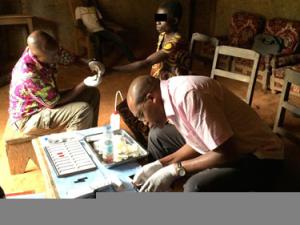

Research Bio
The research program in Vincent Resh's laboratory follows three lines: (1) studies of the evolutionary biology and ecology of aquatic insects, crustaceans, and molluscs in stream and river habitats; (2) the evaluation of habitat manipulations for use in environmental restoration or enhancement, control of water-borne disease vectors of humans, and the use of manipulations in examining underlying influences of ecological interactions; and (3) and the development of techniques for the biological assessment of water quality.
The ecological studies of aquatic invertebrates involve descriptive and experimental approaches to life history studies, herbivore-plant interactions, effects of disturbance, and other topics related to population dynamics, biotic and abiotic interactions, and community structure and function. These studies currently are being conducted in California coastal streams and on the diadromous fauna in oceanic island streams near the UC Berkeley research station in Moorea, French Polynesia. Previous research has been on the control of vectors of river blindness (onchocerciasis) in West Africa through the World Health Organization, and evaluation of the impact of large dams on the Mekong and other Southeast Asian rivers, through various international agencies.
In his research on habitat manipulations, emphasis has been on developing an understanding of how hydraulic forces affect the distribution of organisms, and how these forces can be modified to enhance running-water habitats in stream restoration. These approaches have been used in the habitat restoration of Strawberry Creek on the U.C. Berkeley campus. Habitat manipulations have also been used to control pestiferous and disease-transmitting mosquitoes.
Research in the biological assessment of water quality involves the use of several long-term data sets (> 20 years in duration) to evaluate the natural variability in unperturbed systems, levels of change that occur in perturbed systems, and to use this information in establishing thresholds to indicate whether impact has occurred. Current research also includes the development of population, community, and ecosystem indicators for use in water quality assessment. Related to these topics are the development of methods for the evaluation of mitigation procedures and habitat restoration programs.
He is particularly interested in developing approaches that can be used for biological monitoring and assessment of water quality in developing countries and by volunteer monitoring groups. He has conducted this research in over a score of countries in Africa and Asia.
In summary, the current and future research directions that he encourages the students in his laboratory to pursue involve basic, quantitative research in aquatic entomology and ecology, and the incorporation of this research into a framework that can be used to solve applied problems of water-quality assessment and habitat restoration. Graduates from this laboratory continue to pursue these goals in universities, environmental consulting firms, industries, and government agencies.
Research Expertise and Interest
ecology, water resources, pollution, monitoring, water-borne diseases
In the News
Smartphone Video Microscope Automates Detection of Parasites in Blood
A UC Berkeley-led research team has developed a new mobile phone microscope that uses video to automatically detect and quantify infection by parasitic worms in a drop of blood. This technology could help revive efforts to eradicate debilitating diseases in Africa by providing critical information for health providers in the field.

